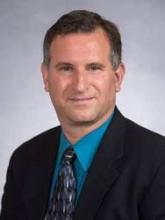Palliative care often involves the treatment of depression and anxiety, along with pain relief and managing lack of appetite, areas that are familiar ground for psychiatrists.
So are psychiatrists a natural addition to the palliative care team? Dr. Dean Schuyler of Charleston, S.C., says yes.
For the last 4 years, Dr. Schuyler has worked alongside three internists, a social worker, a chaplain, and other providers, as part of the palliative care team working at the Ralph H. Johnson Veterans Affairs Medical Center in Charleston. He uses cognitive therapy to counsel patients at the VA’s attached community living center, where many patients receive end-of-life care, as well as the medical center’s oncology and geriatric clinics.
When talking to patients at the end of life, Dr. Schuyler focuses on their mindset. For instance, when he visits with veterans with a terminal diagnosis, he always asks them about their plans. The answer, for most patients, is “I’m here to die.” But a week later, after meeting with a recreational therapist, patients typically have a plan, whether it’s a project with woodworking, or art, or writing.
Sometime during that week, the patient’s mindset changes, Dr. Schuyler said.
“It seems sort of obvious to me that cognitive therapy would have a role here. If you deal with their thoughts, can you help them? I think that applying this theory to these patients at this point makes an enormous amount of sense,” he said.
But Dr. Schuyler said engaging patients at the end of life can be accomplished in many ways. For instance, Dr. William S. Breitbart of Memorial Sloan Kettering in New York has written about a model of meaning-centered group psychotherapy that can help patients at the end of life. And Dr. Harvey Max Chochinov of the University of Manitoba has advanced the concept of dignity therapy.
While Dr. Schuyler’s role was unusual 4 years ago, the role for psychiatrists in palliative care is expanding today.
Dr. Scott A. Irwin, director of palliative care psychiatry at the University of California, San Diego Health System, said there is a range of ways for psychiatrists to be involved in palliative care. Some psychiatrists work as consultants to a palliative care team, providing expertise on the psychosocial elements of care. A smaller number of psychiatrists are embedded within front-line teams.
Dr. Irwin said he sees embedding psychiatrists as the most-effective model, because this approach gives the care team a well-rounded range of knowledge, with experts on physical symptom control and in psychosocial areas. For some patients, the psychiatrist’s role will be small, but it’s important to have someone there to make differential diagnoses that distinguish between normal reactions and those needing higher-level intervention, such as a patient with normal grief vs. major clinical depression, he said.
“By being part of the team, I make the palliative care clinicians better, and they make me better,” said Dr. Irwin, who also serves as director of patient and family support services at the the university’s Moores Cancer Center. “And the patient care, which is the focus, is better than it could be if we were just working in parallel.”
But some obstacles lie within the embedded model. For example, Dr. Irwin said, even though a growing number of psychiatrists are interested in getting involved, they sometimes get pushback from the specialists on the palliative care team. At the same time, he has heard from palliative care physicians who say they want to add psychiatrists to the team but can’t find anyone with the time or interest to do it.
Despite those challenges, Dr. Irwin is optimistic that psychiatry will have an expanded role in palliative care.
One reason is that addressing psychiatric needs through palliative care can help hospitals reduce costs for some of their most complex patients by reducing unnecessary readmissions, trips to emergency departments, and decreasing lengths of stay in the hospital.
“If we continue down this path toward quality measures and the value equation, we’ll see this more and more, because palliative care and psychiatric care, separately and together, are a huge part of increasing quality while decreasing costs for health care,” Dr. Irwin said.
Another factor that could increase the prevalence of psychiatry in palliative care is board certification, said Dr. Maria I. Lapid, a geriatric psychiatrist at the Mayo Clinic in Rochester, Minn.
Dr. Lapid, who is board certified in hospice and palliative medicine through the American Board of Psychiatry and Neurology, said the availability of board certification probably will push psychiatrists to play a bigger role in providing palliative care. In all, 10 boards under the umbrella of the American Board of Medical Specialties offer some form of hospice and palliative medicine certification, which she said will contribute to making palliative care “truly interdisciplinary.”



